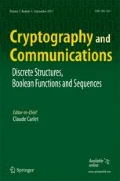Abstract
We consider a special type of sequence of arithmetic progressions, in which consecutive progressions are related by the property: ithterms ofjth, (j + 1)thprogressions of the sequence are multiplicative inverses of each other modulo(i + 1)thterm ofjthprogression. Such a sequence is uniquely defined for any pair of co-prime numbers. A computational problem, defined in the context of such a sequence and its generalization, is shown to be equivalent to the integer factoring problem. The proof is probabilistic. As an application of the equivalence result, we propose a method for how users securely agree upon secret keys, which are ensured to be random. We compare our method with factoring based public key cryptographic systems: RSA (Rivest et al., ACM 21, 120–126, 1978) and Rabin systems (Rabin 1978). We discuss the advantages of the method, and its potential use-case in the post quantum scenario.
Similar content being viewed by others
Notes
A worst case instance of IFP is a large number n, called RSA number, which is the product of two equally sized primes p, and q. In other words, both p and q are about \(\sqrt {n}\).
Some sensitive military applications already use RSA system with 3096-bit △
In the post-quantum scenario, g should be of length at least 256 binary bits
Probable candidates for \(\mathcal {E}\) are McEliece’s cryptosystem, NTRU, HFE, and other Lattice-based cryptosystems
References
Cocks, C.: An identity based encryption scheme based on quadratic residues. In: Proceeding of 8th IMA International Conference on Cryptography and Coding, London, pp 360–363 (2001)
Goldwasser, S., Micali, S.: Probabilistic encryption. J. Comput. Syst. Sci. 28, 270–299 (1984)
Ireland, K., Rosen, M.: A Classical Introduction to Modern Number Theory, 2nd edn., pp 34–38. Springer, New York (1990)
Knuth, D. E.: The art of computer programming: Semi numerical algorithms, volume 2, chapter 4, second edition (1998)
Lenstra, A. K., Lenstra, H. W. Jr (eds.): The Development of the Number Field Sieve. Lecture Notes in Mathematics. Springer, Berlin (1993)
Rabin, M. O.: Digitalized signatures. Foundations of Security Computation, 155–168 (1978)
Rivest, R. L., Shamir, A., Adleman, L.: A method for obtaining digital signatures and public key cryptosystems. Commun. ACM 21, 120–126 (1978)
Shor, P.: Polynomial-time algorithms for prime factorization and discrete logarithms on a quantum computer. SIAM J. Comput. 26(5), 1484–1509 (1997)
Srikanth, C.h.: Number theoretic, computational and cryptographic aspects of a certain sequence of arithmetic progressions. PhD thesis, Indian Institute of Science (2017)
Srikanth, Ch., Veni Madhavan, C.E., Kumara Swamy, H.V.: Family of PRGs based on collections of arithmetic progressions - IACR Cryptology ePrint Archive 2017: 324 - http://eprint.iacr.org/2017/324.pdf (2017)
Acknowledgments
The author is thankful to anonymous referees for their valuable comments and suggestions. The author is grateful to his doctoral advisor Prof.Veni Madhavan and a senior member Kumara Swamy for their invaluable inputs on the research problem.
Author information
Authors and Affiliations
Corresponding author
Additional information
Publisher’s note
Springer Nature remains neutral with regard to jurisdictional claims in published maps and institutional affiliations.
This article belongs to the Topical Collection: Special Issue of Sequences and Their Applications II
Guest Editors: Kai-Uwe Schmidt and Udaya Parampalli
Rights and permissions
About this article
Cite this article
Srikanth, C. Certain sequence of arithmetic progressions and a new key sharing method. Cryptogr. Commun. 12, 597–612 (2020). https://doi.org/10.1007/s12095-019-00416-z
Received:
Accepted:
Published:
Issue Date:
DOI: https://doi.org/10.1007/s12095-019-00416-z
Keywords
- Sequence of arithmetic progressions
- Euclidean gcd algorithm
- RSA system
- Integer factoring
- Quadratic residuosity
- Key sharing method


